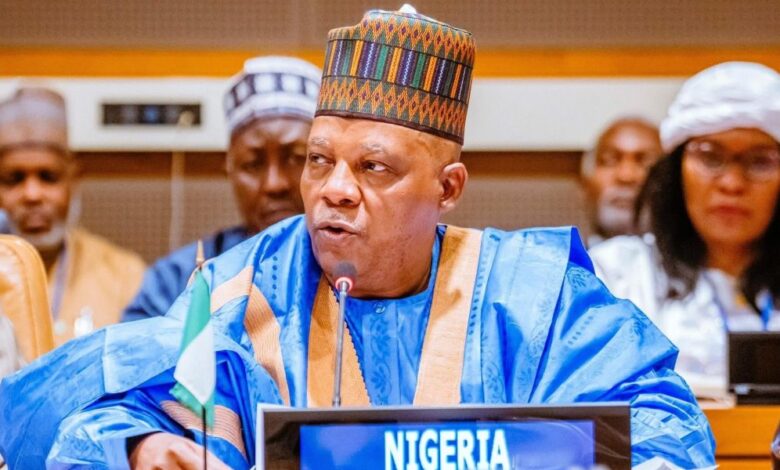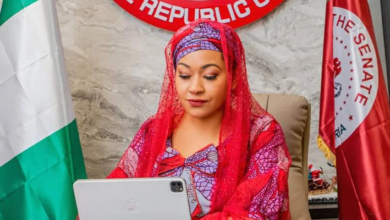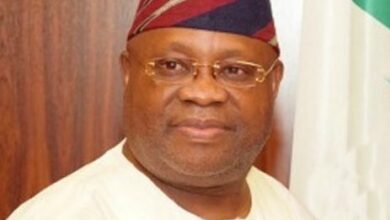Shettima Defends Dangote, Warns Labour Unions Against ‘Sabotaging Nigeria’s Future’

Every October 5, the world pauses to celebrate one of humanity’s most enduring callings – teaching. World Teachers’ Day is not just another ceremonial marker on the international calendar; it is a reflective moment to appraise the condition of those who bear the noble burden of nurturing minds, shaping destinies, and defining the moral and intellectual compass of nations. The 2025 theme, “Recasting Teaching as a Collaborative Profession,” jointly declared by UNESCO, ILO, UNICEF, and Education International, invites the world to reimagine education as a shared enterprise, powered by collective intelligence, cooperation, and mutual respect among all stakeholders.
Central to this year’s theme is its recognition of the teacher as the indispensable nerve centre of education and national development. The goal is to create a global environment where teachers can “fully deploy their talent and vocation,” supported by policies and resources that make their work not only impactful but also dignifying. These bodies, therefore, urge governments, partners, and the international community to institutionalize collaboration as a normative culture within the teaching profession, because, as they rightly argue, only through cooperation at all levels can we build inclusive, equitable, and resilient education systems.
Since its inception in 1994, World Teachers’ Day has been marked by lofty themes and eloquent declarations, yet in many countries, Nigeria prominently among them, the celebration has become more ritual than reform. Speeches are made, plaques awarded, and hashtags trended, but the fundamental issues of poor funding, teacher neglect, and systemic decay remain largely unaddressed. This year’s theme, however, offers a chance to break from the past by reframing teaching as a collaborative profession rather than a solitary vocation carried by overburdened individuals. To recast teaching as collaborative means building an ecosystem where teachers, mentors, policymakers, researchers, and communities work together to co-create knowledge, innovate pedagogical practices, and address local learning challenges. It requires breaking the silos that have long trapped teachers in isolation, and instead fostering professional communities of practice within schools, districts, and states.
But for collaboration to flourish, the state must first address the structural deficits that keep teachers demoralized and alienated. Collaboration cannot thrive in hunger, nor can creativity blossom under unpaid salaries and decaying classrooms. The world cannot expect teachers to inspire curiosity and excellence while they themselves live under conditions of deprivation and despair.
Let’s pause briefly to ponder the grim arithmetic of neglect of the noble profession. The World Bank, had in a recent Report, warned that the global teacher deficit has reached a staggering 44 million, with Africa bearing the worst shortages. Nigeria’s own statistics paint an even grimmer picture. According to the Universal Basic Education Commission (UBEC), only 915,913 teachers currently cater to over 31.7 million pupils in primary schools, an alarming ratio of 35:1, well above UNESCO’s recommended 25:1 for effective learning. In higher education, the figures are even more disheartening. Rabia Adamu, Chair of the Governing Council of the Federal College of Education, Ofeme-Ohuhu, estimates that Nigeria needs at least 1.2 million teachers to fill the existing gaps. Worse still, the student–lecturer ratio in some universities now ranges from 1:300 to 1:400, making meaningful engagement and mentorship nearly impossible. UNESCO’s response has been to work with member states to assess teaching needs and develop strong, evidence-based teacher policies in nine key domains, from recruitment and professional development to retention and career progression. However, such global interventions will remain cosmetic if Nigeria fails to domesticate these frameworks through sincere commitment and adequate funding.
This takes us to the crisis of commitment and the politics of underfunding. Nigeria’s chronic underfunding of education is perhaps the single greatest threat to the future of its teaching profession. In 2023, the Federal Government allocated ₦1.54 trillion (6.39%) of the national budget to education, and ₦2.18 trillion (7.9%) in 2024, still far below UNESCO’s benchmark of 15–20% for developing nations. The situation is hardly better at the subnational level. Kano State, for instance, budgeted ₦10.5 billion for UBE counterpart funding but released a paltry ₦581 million in the first half of 2024. This is in a state where more than 4.7 million pupils were forced to learn while sitting on bare floors. Many governors have not recruited teachers in a decade, leaving Parents-Teachers Associations and alumni bodies to shoulder the burden of hiring and paying contract teachers. These PTA teachers, poorly trained and grossly underpaid, are the unsung victims of Nigeria’s broken education system. Asking them to engage in “collaborative teaching” without addressing their welfare is akin to asking the blind to lead the blind. Collaboration is not possible when teachers are too hungry to think, too overworked to plan, and too underpaid to care, and daily hounded and taunted by the hackneyed demeaning phrase – ‘teachers’ reward is in heaven’.
The Nigerian teacher today occupies a paradoxical position: indispensable yet invisible, celebrated yet impoverished. As of October 2024, twelve states were still paying teachers the ₦18,000 minimum wage approved in 2011, despite the July 2024 enactment of a new ₦70,000 minimum wage law. Sixteen states have not recruited a single teacher between 2018 and 2022, according to the Nigerian Union of Teachers (NUT). The disparity in welfare between Nigerian teachers and their global counterparts is scandalous. In Finland, where teaching is a master’s degree profession, educators earn between €32,000 and €41,000 annually, enjoy health insurance, and command social respect higher than that of doctors or engineers. In Nigeria, as former OAU Vice-Chancellor Wande Abimbola lamented, “a gardener in the United States earns more than a professor here.” Terrible! Such conditions inevitably fuel the brain drain. Between 2016 and 2022, the University of Lagos alone lost 239 first-class graduates employed as lecturers, a microcosm of the national hemorrhage of intellectual capital.
Yet, one can still draw succor from islands of hope in a sea of apathy and insensitivity. Amidst this bleak landscape however, there are glimmers of hope. Enugu State, under Governor Peter Mba, has become a model for education-driven governance. In his 2025 budget, Mba allocated an unprecedented 33% to education, surpassing even UNESCO’s recommendation. His administration’s Smart School Project, spanning all 260 wards of the state, seeks to revolutionize classroom learning through digital innovation, teacher retraining, and community participation.
This kind of visionary investment demonstrates that transformation is possible when leadership is guided by conviction rather than convenience. Other states and the Federal Government must follow suit by aligning their education budgets with development priorities, not political patronage.
Equally, there is a need for accountability in resource utilization. UBEC revealed that over ₦135 billion in matching grants for basic education remained unaccessed between 2020 and 2024, a telling indicator of bureaucratic inertia and lack of political will. Meanwhile, Tunisia allocates 20% of its budget to education; South Africa, 18%; and Seychelles, the first African country to achieve UNESCO’s Education for All target, invests heavily in both teacher training and digital infrastructure.
To “recast teaching as a collaborative profession” in Nigeria, three foundational steps are indispensable – revalorization, professionalization, and collaboration. First, teachers must be revalorized, that is, socially and economically revalued as national assets rather than expendable civil servants. This requires competitive pay, housing incentives, continuous professional development, and recognition of teachers as key policy stakeholders, not mere implementers of bureaucratic directives. Second, teaching must be professionalized through stricter entry standards, competency-based training, and structured mentorship. Teaching without certification or pedagogical grounding must be phased out. A teacher’s license should carry the same weight as a medical or legal license, and the breach of ethical codes should attract corresponding sanctions. Third, collaboration must become a realistic practice. Teachers should not work in isolation but in networks, collaborating with colleagues, parents, researchers, and policymakers. This involves digital literacy, peer mentoring, and the institutionalization of learning communities across schools and states. Platforms for exchange of ideas, innovations, and best practices should be created and supported.
The teacher’s role in nation-building is beyond dispute. No nation can rise above the quality of its teachers. But for teachers to inspire greatness in others, society must first invest in their own greatness. Collaboration, as envisioned in the 2025 theme, is not merely about teamwork within classrooms; it is about building a new social contract between teachers and the state, one founded on respect, reciprocity, and shared purpose. Nigeria must therefore strive to reinvent the teaching profession as a cornerstone of national renewal. The federal and state governments must invest more in teacher recruitment, training, and welfare; the private sector and development partners must support teacher innovation and school improvement projects; and communities must reclaim ownership of schools as shared spaces for collective progress.
The time has come to move beyond tokenism and lip service. Celebrating teachers once a year without addressing their plight is hypocrisy. The world that ignores its teachers today will awaken tomorrow to a generation it cannot teach, and a future it cannot lead. If Nigeria is serious about transforming its education system, it must begin by dignifying the men and women who stand daily before chalkboards, nurturing the minds that will build tomorrow’s nation. Recasting teaching as a collaborative profession is therefore not just a global slogan; it is a national imperative. Only when Nigeria’s teachers are valued, empowered, and respected will the classroom once again become a place where dreams are born, not buried. Perhaps then, the reward of teachers would no longer be deferred routinely to that far-flung, unfathomable, and indeterminate abode called heaven. By the way, the word ‘reward’ not only connotes a great deal of tokenism but smacks of gift (járá) to an undeserving set of street urchins. Teachers are core professionals that deserve their well-earned remunerations, not ‘reward’.
Post Views: 71





